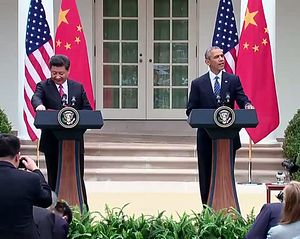Reporters and commentators have devoted most of their attention following President Xi Jinping’s visit to the United States to a few issues: cybersecurity, climate cooperation, business relationships, and maritime disputes. As I’ve written elsewhere, in each case, we will have to wait and see to assess any progress that might have been made.
The governments, however, released lengthy documents at the end of Xi’s visit, with general and economic “fact sheets” from the U.S. government and a combined “outcome list” from the Chinese Foreign Ministry. Drawn from those documents, here are five largely overlooked developments in U.S.–China relations from the current visit.
(1) China accepts U.S. invitation to RIMPAC 2016 military exercise
Both governments, using very similar language, noted new confidence-building measures on air-to-air encounters between their militaries. The Chinese version, however, included something the United States didn’t: “At the invitation of the United States Pacific Command, the Chinese Navy will participate in the RIMPAC-2016 joint exercise.”
RIMPAC, the “Rim of the Pacific Exercise,” is a massive joint exercise including 22 participant militaries, as of the last time it was held last year. China’s inaugural participation, in 2014, was controversial among those who oppose deeper military ties between the United States and China and caused a stir when the Chinese military sent along a surveillance ship, in addition to the hardware participating in the exercise. This and other factors led some to advocate disinviting China from the 2016 exercise.
Though the U.S. government has not apparently commented on the matter, China has announced its plans to participate.
(2) U.S. and China commit to ‘nearly complete bans’ on ivory import and export
Following on a June statement of intent to further restrict ivory sales, the two countries (in identical language) “commit to enact nearly complete bans on ivory import and export, including significant and timely restrictions on the import of ivory as hunting trophies, and to take significant and timely steps to halt the domestic commercial trade of ivory.”
This commitment will not end the illegal trade in ivory, but Peter Knights, CEO of the advocacy group WildAid, said the joint announcement was “the greatest single step that could be taken to reduce poaching for elephants. Legal ivory trade has always been used as a cover to launder poached ivory.” Though implementation and enforcement deserve scrutiny, this appears to be a positive development for wildlife protection.
(3) China appears to accept U.S. concerns on national security reviews for investment
The ongoing negotiations toward a bilateral investment treaty (BIT) seem to have shown minimal progress, but a related issue—how the governments review inbound direct investment for adverse national security implications—saw an at least rhetorical breakthrough.
After June’s Strategic and Economic Dialogue (S&ED), the U.S. government reported that “we stressed our strong concerns that China’s national security review is too broad in its scope, considers numerous issues that go well beyond genuine national security concerns and expressly affords third parties an inappropriate role in the review process.” After the Obama–Xi meeting, both governments released identical language on the issue. Among other things, the two countries “commit to limit the scope of their respective national security reviews of foreign investments (for the United States, the CFIUS process) solely to issues that constitute national security concerns, and not to generalize the scope of such reviews to include other broader public interest or economic issues.”
In other words, the parallel statements appear to represent Chinese acceptance of some U.S. concerns stemming from the new Chinese National Security Law, as well as some language that addresses Chinese concerns about the CFIUS (Committee on Foreign Investment in the United States) review process. These kinds of agreements might become part of an eventual BIT.
(4) $100 million venture announced to build high-speed rail from Los Angeles to Las Vegas
The Chinese “outcome list” includes several elements from Xi’s time in the United States prior to visiting Obama in Washington. Easily the most ambitious is the formation of a China–U.S. joint venture to build high-speed rail between Los Angeles and Las Vegas. The Chinese partner is China Railway International, reportedly “owned by a consortium made up of subsidiaries from state firms China Railway Group, CRRC Corp, China State Construction Engineering Corporation and China Railway Signal & Communication Corporation.”
With reported initial capital of $100 million, this could be a landmark not only for U.S. rail development but also for Chinese infrastructure investment and development in the United States. Surely there are significant regulatory challenges, but the decision to highlight this deal during Xi’s visit suggests a strong degree of confidence.
(5) U.S. and China in closer alignment over international development and AIIB
Both governments devoted significant passages to joint language on U.S.–China cooperation in international finance. That led the Financial Times to report that “U.S. officials have declared what amounts to a truce” in a supposed fight between the United States and China regarding China’s Asian Infrastructure Investment Bank (AIIB). In reality, U.S. opposition to the AIIB has been widely regarded as a mistake, and a failure to boot. Still, the governments seem to be in alignment on key issues.
Both statements read: “In light of China’s increased share of global economic activity and increased capacity, the United States welcomes China playing a more active role in and taking on due responsibility for the international financial architecture, as well as expanded bilateral cooperation to address global economic challenges.” The United States further commits to implement IMF reforms “as soon as possible” and supports the Chinese currency for inclusion in the IMF’s Special Drawing Rights (SDR) basket of currencies, “provided the currency meets the IMF’s existing criteria.”
Given that the two governments should never have been at odds over AIIB, this cautious embrace is only modest progress. Sometimes, however, that’s the best we can hope for in the short term.
Graham Webster (@gwbstr) is a researcher, lecturer, and senior fellow of The China Center at Yale Law School. Sign up for his free e-mail brief, U.S.–China Week.

































